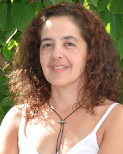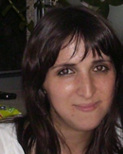(Saturday 23rd of September 2023)
-
-
 Helena Moniz hmoniz@fd.uc.ptHelena Moniz, who has a Ph.D. in Juridical-Criminal Sciences, is Assistant Professor at the Faculty of Law at the University of Coimbra. She is a member of the board and researcher at the Centre for Biomedical Law. Her research interests are penal law, penal procedure law and medical penal law. She has been involved in several European research projects investigating the protection of medical and genetic data (http://www.privireal.org/ — from 2003 to 2005 — and http://www.privileged.group.shef.ac.uk/ — from 2007 to 2009). Helena Moniz was a member of the committee which drafted the bill that provided the basis for Law 5/2008 of 12 February and established the principles for the creation and maintenance of the Portuguese forensic DNA database. She is currently a member of the Supervisory Board of the national DNA database.
Helena Moniz hmoniz@fd.uc.ptHelena Moniz, who has a Ph.D. in Juridical-Criminal Sciences, is Assistant Professor at the Faculty of Law at the University of Coimbra. She is a member of the board and researcher at the Centre for Biomedical Law. Her research interests are penal law, penal procedure law and medical penal law. She has been involved in several European research projects investigating the protection of medical and genetic data (http://www.privireal.org/ — from 2003 to 2005 — and http://www.privileged.group.shef.ac.uk/ — from 2007 to 2009). Helena Moniz was a member of the committee which drafted the bill that provided the basis for Law 5/2008 of 12 February and established the principles for the creation and maintenance of the Portuguese forensic DNA database. She is currently a member of the Supervisory Board of the national DNA database.
Additional information:
-
 Susana Costa susanacosta@ces.uc.ptSusana Costa is a researcher at the Centre for Social Studies of the University of Coimbra and a member of the Research Group on Studies on Science, Economy and Society (NECES). She holds a Ph.D. in Sociology awarded by the University of Coimbra for her thesis on DNA testing in paternity suits. Her research interests have focused on the relationship between science and law, including an ethnographic study in a forensic laboratory. She is currently developing a study on the evolution of the uses of DNA technology in criminal investigation, involving a comparative approach to Portugal and the United Kingdom.
Susana Costa susanacosta@ces.uc.ptSusana Costa is a researcher at the Centre for Social Studies of the University of Coimbra and a member of the Research Group on Studies on Science, Economy and Society (NECES). She holds a Ph.D. in Sociology awarded by the University of Coimbra for her thesis on DNA testing in paternity suits. Her research interests have focused on the relationship between science and law, including an ethnographic study in a forensic laboratory. She is currently developing a study on the evolution of the uses of DNA technology in criminal investigation, involving a comparative approach to Portugal and the United Kingdom.
Additional information:
-
-
 Susana Silva
susilva@med.up.ptSusana Silva, who has a Ph.D. in Sociology, is a researcher at the Department of Hygiene and Epidemiology and the Cardiovascular R&D Unit at the University of Porto Medical School. Her research centres on the links between science, law, technology and gender, focusing on public understanding of biotechnology and health and on the social uses of genetic and reproductive technologies. She is involved in several scientific research projects, with the support of the Foundation for Science and Technology, including coordinating a study on the decisions of infertile couples regarding the fate of cryopreserved embryos.
Additional information:
Susana Silva
susilva@med.up.ptSusana Silva, who has a Ph.D. in Sociology, is a researcher at the Department of Hygiene and Epidemiology and the Cardiovascular R&D Unit at the University of Porto Medical School. Her research centres on the links between science, law, technology and gender, focusing on public understanding of biotechnology and health and on the social uses of genetic and reproductive technologies. She is involved in several scientific research projects, with the support of the Foundation for Science and Technology, including coordinating a study on the decisions of infertile couples regarding the fate of cryopreserved embryos.
Additional information:
-
 Manuela Ivone Cunha micunha@ics.uminho.ptManuela Ivone Cunha, who has a Ph.D. in Anthropology, is Assistant Professor at the University of Minho. She is a member of the Centro em Rede de Investigação em Antropologia (at the CRIA-UM centre in Portugal) and the Institut d'Ethnologie Méditerranéenne et Comparative (IDEMEC/CNRS, France) and also collaborates with the Research Centre for the Social Sciences (CICS-UM) and the Centre for Human Rights – Interdisciplinary Research Centre (DH-CII - UM). Her research has focused mainly on prisons and total institutions, crime, gender and ethnicity, informal economies and the comparative structures of drug markets. Recently, she coordinated a research project on power, the politics of the body and vaccination.
Manuela Ivone Cunha micunha@ics.uminho.ptManuela Ivone Cunha, who has a Ph.D. in Anthropology, is Assistant Professor at the University of Minho. She is a member of the Centro em Rede de Investigação em Antropologia (at the CRIA-UM centre in Portugal) and the Institut d'Ethnologie Méditerranéenne et Comparative (IDEMEC/CNRS, France) and also collaborates with the Research Centre for the Social Sciences (CICS-UM) and the Centre for Human Rights – Interdisciplinary Research Centre (DH-CII - UM). Her research has focused mainly on prisons and total institutions, crime, gender and ethnicity, informal economies and the comparative structures of drug markets. Recently, she coordinated a research project on power, the politics of the body and vaccination.
Additional information:
-
 Filipe Santos filipesantos@ces.uc.ptFilipe Santos has a Masters degree in Sociology awarded by the Department of Sociology at the Institute of Social Sciences of the University of Minho. He is currently a Ph.D. candidate at the same institution, developing a thesis entitled “The ‘CSI Effect’: Impacts of popular culture on representations of DNA evidence”. This study aims to understand the perspectives of different actors involved in the social co-construction of representations of forensic genetics and the impacts of fictional and media imagery on the uses of DNA in criminal investigation. His research interests lie in the intersections and mediated interrelations between science and technology, justice and citizens.
Filipe Santos filipesantos@ces.uc.ptFilipe Santos has a Masters degree in Sociology awarded by the Department of Sociology at the Institute of Social Sciences of the University of Minho. He is currently a Ph.D. candidate at the same institution, developing a thesis entitled “The ‘CSI Effect’: Impacts of popular culture on representations of DNA evidence”. This study aims to understand the perspectives of different actors involved in the social co-construction of representations of forensic genetics and the impacts of fictional and media imagery on the uses of DNA in criminal investigation. His research interests lie in the intersections and mediated interrelations between science and technology, justice and citizens.
Additional information:
-
 Helena Machado hmachado@ics.uminho.pt
Helena Machado hmachado@ics.uminho.pt 

 Helena Moniz hmoniz@fd.uc.ptHelena Moniz, who has a Ph.D. in Juridical-Criminal Sciences, is Assistant Professor at the Faculty of Law at the University of Coimbra. She is a member of the board and researcher at the Centre for Biomedical Law. Her research interests are penal law, penal procedure law and medical penal law. She has been involved in several European research projects investigating the protection of medical and genetic data (http://www.privireal.org/ — from 2003 to 2005 — and http://www.privileged.group.shef.ac.uk/ — from 2007 to 2009). Helena Moniz was a member of the committee which drafted the bill that provided the basis for Law 5/2008 of 12 February and established the principles for the creation and maintenance of the Portuguese forensic DNA database. She is currently a member of the Supervisory Board of the national DNA database.
Helena Moniz hmoniz@fd.uc.ptHelena Moniz, who has a Ph.D. in Juridical-Criminal Sciences, is Assistant Professor at the Faculty of Law at the University of Coimbra. She is a member of the board and researcher at the Centre for Biomedical Law. Her research interests are penal law, penal procedure law and medical penal law. She has been involved in several European research projects investigating the protection of medical and genetic data (http://www.privireal.org/ — from 2003 to 2005 — and http://www.privileged.group.shef.ac.uk/ — from 2007 to 2009). Helena Moniz was a member of the committee which drafted the bill that provided the basis for Law 5/2008 of 12 February and established the principles for the creation and maintenance of the Portuguese forensic DNA database. She is currently a member of the Supervisory Board of the national DNA database.

 Susana Costa susanacosta@ces.uc.ptSusana Costa is a researcher at the Centre for Social Studies of the University of Coimbra and a member of the Research Group on Studies on Science, Economy and Society (NECES). She holds a Ph.D. in Sociology awarded by the University of Coimbra for her thesis on DNA testing in paternity suits. Her research interests have focused on the relationship between science and law, including an ethnographic study in a forensic laboratory. She is currently developing a study on the evolution of the uses of DNA technology in criminal investigation, involving a comparative approach to Portugal and the United Kingdom.
Susana Costa susanacosta@ces.uc.ptSusana Costa is a researcher at the Centre for Social Studies of the University of Coimbra and a member of the Research Group on Studies on Science, Economy and Society (NECES). She holds a Ph.D. in Sociology awarded by the University of Coimbra for her thesis on DNA testing in paternity suits. Her research interests have focused on the relationship between science and law, including an ethnographic study in a forensic laboratory. She is currently developing a study on the evolution of the uses of DNA technology in criminal investigation, involving a comparative approach to Portugal and the United Kingdom.

 Adriana Silva rosasilva@ces.uc.ptAdriana Silva has a Masters degree in Sociology awarded by the Department of Sociology at the Institute of Social Sciences of the University of Minho. She is junior researcher at the Centre for Social Studies at the University of Coimbra. She is currently a Ph.D. student in Sociology at the University of Minho. She is a grant holder in the project “Forensic DNA databases in Portugal - contemporary issues in ethics, practices and policy” hosted at the Centre for Social Studies of the University of Coimbra. Her research interests are focused on deviance and crime.
Adriana Silva rosasilva@ces.uc.ptAdriana Silva has a Masters degree in Sociology awarded by the Department of Sociology at the Institute of Social Sciences of the University of Minho. She is junior researcher at the Centre for Social Studies at the University of Coimbra. She is currently a Ph.D. student in Sociology at the University of Minho. She is a grant holder in the project “Forensic DNA databases in Portugal - contemporary issues in ethics, practices and policy” hosted at the Centre for Social Studies of the University of Coimbra. Her research interests are focused on deviance and crime.  Susana Silva
susilva@med.up.ptSusana Silva, who has a Ph.D. in Sociology, is a researcher at the Department of Hygiene and Epidemiology and the Cardiovascular R&D Unit at the University of Porto Medical School. Her research centres on the links between science, law, technology and gender, focusing on public understanding of biotechnology and health and on the social uses of genetic and reproductive technologies. She is involved in several scientific research projects, with the support of the Foundation for Science and Technology, including coordinating a study on the decisions of infertile couples regarding the fate of cryopreserved embryos.
Susana Silva
susilva@med.up.ptSusana Silva, who has a Ph.D. in Sociology, is a researcher at the Department of Hygiene and Epidemiology and the Cardiovascular R&D Unit at the University of Porto Medical School. Her research centres on the links between science, law, technology and gender, focusing on public understanding of biotechnology and health and on the social uses of genetic and reproductive technologies. She is involved in several scientific research projects, with the support of the Foundation for Science and Technology, including coordinating a study on the decisions of infertile couples regarding the fate of cryopreserved embryos.

 Manuela Ivone Cunha micunha@ics.uminho.ptManuela Ivone Cunha, who has a Ph.D. in Anthropology, is Assistant Professor at the University of Minho. She is a member of the Centro em Rede de Investigação em Antropologia (at the CRIA-UM centre in Portugal) and the Institut d'Ethnologie Méditerranéenne et Comparative (IDEMEC/CNRS, France) and also collaborates with the Research Centre for the Social Sciences (CICS-UM) and the Centre for Human Rights – Interdisciplinary Research Centre (DH-CII - UM). Her research has focused mainly on prisons and total institutions, crime, gender and ethnicity, informal economies and the comparative structures of drug markets. Recently, she coordinated a research project on power, the politics of the body and vaccination.
Manuela Ivone Cunha micunha@ics.uminho.ptManuela Ivone Cunha, who has a Ph.D. in Anthropology, is Assistant Professor at the University of Minho. She is a member of the Centro em Rede de Investigação em Antropologia (at the CRIA-UM centre in Portugal) and the Institut d'Ethnologie Méditerranéenne et Comparative (IDEMEC/CNRS, France) and also collaborates with the Research Centre for the Social Sciences (CICS-UM) and the Centre for Human Rights – Interdisciplinary Research Centre (DH-CII - UM). Her research has focused mainly on prisons and total institutions, crime, gender and ethnicity, informal economies and the comparative structures of drug markets. Recently, she coordinated a research project on power, the politics of the body and vaccination.

 Filipe Santos filipesantos@ces.uc.ptFilipe Santos has a Masters degree in Sociology awarded by the Department of Sociology at the Institute of Social Sciences of the University of Minho. He is currently a Ph.D. candidate at the same institution, developing a thesis entitled “The ‘CSI Effect’: Impacts of popular culture on representations of DNA evidence”. This study aims to understand the perspectives of different actors involved in the social co-construction of representations of forensic genetics and the impacts of fictional and media imagery on the uses of DNA in criminal investigation. His research interests lie in the intersections and mediated interrelations between science and technology, justice and citizens.
Filipe Santos filipesantos@ces.uc.ptFilipe Santos has a Masters degree in Sociology awarded by the Department of Sociology at the Institute of Social Sciences of the University of Minho. He is currently a Ph.D. candidate at the same institution, developing a thesis entitled “The ‘CSI Effect’: Impacts of popular culture on representations of DNA evidence”. This study aims to understand the perspectives of different actors involved in the social co-construction of representations of forensic genetics and the impacts of fictional and media imagery on the uses of DNA in criminal investigation. His research interests lie in the intersections and mediated interrelations between science and technology, justice and citizens.

 Daniel Maciel danielmaciel@ces.uc.ptDaniel Maciel has a Masters degree in Medical Anthropology awarded by the University of Coimbra and is a Junior Researcher at the Center for Social Studies of the University of Coimbra. He is a grant holder in the project “Forensic DNA databases in Portugal - contemporary issues in ethics, practices and policy” hosted at the Centre for Social Studies of the University of Coimbra. He is currently working on a PhD research in Anthropology at the New University of Lisbon, investigating prison art and resistance. His research interests involve the creation of art, its uses and appropriations; institutional discourse, functioning and reasoning and also the maintenance and negotiation of power relations.
Daniel Maciel danielmaciel@ces.uc.ptDaniel Maciel has a Masters degree in Medical Anthropology awarded by the University of Coimbra and is a Junior Researcher at the Center for Social Studies of the University of Coimbra. He is a grant holder in the project “Forensic DNA databases in Portugal - contemporary issues in ethics, practices and policy” hosted at the Centre for Social Studies of the University of Coimbra. He is currently working on a PhD research in Anthropology at the New University of Lisbon, investigating prison art and resistance. His research interests involve the creation of art, its uses and appropriations; institutional discourse, functioning and reasoning and also the maintenance and negotiation of power relations.
